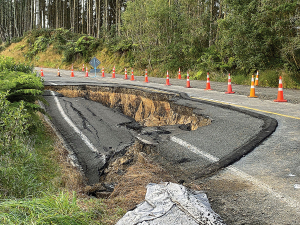OPINION: The importance of rural and provincial roads has suddenly and dramatically come to the fore with the advent of cyclones Hale and Gabrielle and other massive storms that have hit Northland and along the east coast of the North Island.
Surprise, surprise, towns like Wairoa have become islands within an island as have dozens of farms still without power, communications and access to the nearest service town. Milk on many farms can’t be collected and cows have been dried off, wiping thousands of dollars of farm incomes. Other farms and horticultural blocks have been devastated and many people face an uncertain future.
While the two cyclones were horrendous, for many they came on top of some terrible rain events that again cut access to farms and brought down forestry slash, which was a killer blow to bridges, farmland and orchards. Some are now talking about ‘filthy forestry’ and while that may be true, foresters can argue that they are operating by and large within the rules that the Government set. Ironically, forestry itself has been hit by the slash because, in the case of the East Coast, access to the port of Napier has been cut.
The reality is that successive governments have neglected rural areas and instead prioritised urban areas for transport upgrades where there are simply more votes.
The question one can ask is, why spend $30 billion for light rail in Auckland rather than building a secure highway between Napier and Gisborne and around the East Cape? By neglecting rural roads are they happy to see prices for fruit and vegetables rise to a point where they are unaffordable to many people.
The stocking of supermarket shelves depends on getting produce to market. Should money being spent on city cycleways – which are nice but not a necessity – be diverted to strengthening the rural roading network?
Is there a risk in this election year of all parties taking a deep breath and uniting in common sense instead of political expediency and making rural roads, communications and power the number one priority? Will they have the guts to upset a few urban people in big vote areas and make the powerhouse of the economy, rural NZ, the winner of the money?
This would be a courageous move, but if you watch the TV series Yes Minister you will know that politicians of all hews don’t do courageous.
It’s not a vote winning strategy.


















